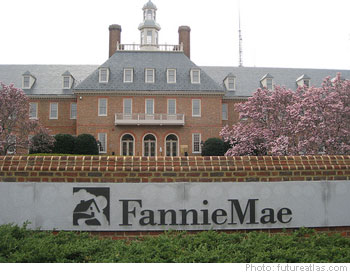 As Fannie Mae (FNM) goes for its next withdrawal from the $200 billion kitty the US Treasury graciously made available to this government-created and -sustained mortgage financer, it may be useful to look beyond the current housing slump and consider what it augers for the future.
As Fannie Mae (FNM) goes for its next withdrawal from the $200 billion kitty the US Treasury graciously made available to this government-created and -sustained mortgage financer, it may be useful to look beyond the current housing slump and consider what it augers for the future.
Having made yet another loss, the government-sponsored enterprise needs more money. A report Fannie filed with the Securities and Exchange Commission attributes the $19 billion third-quarter loss to the housing slump and mortgage defaults. “We do not expect to operate profitably in the foreseeable future,” says the company.
I always thought it was a great triumph of government public relations to come up with the sweet-sounding Fannie Mae moniker for an entity officially called the Federal National Mortgage Association. Now I understand what the nickname really means—a pain in the taxpayers’ backside for the foreseeable future.
The business has been adversely affected by helping delinquent or imminently-in-default borrowers to modify their mortgages so as to reduce their monthly payments. As the economy recovers, defaults will decline, and presumably this aid will no longer be needed. But it is not clear when – or even if – the subsidy program will end.
In fact, it may be extended. Fannie “may recommend supplementing the program with other initiatives that would allow us, pursuant to our mission, to assist more homeowners.”
By conventional wisdom, it is better for everybody and the economy at large that people not default on their mortgages. On that basis, the bailout of shaky homeowners via Fannie is good policy. It is certainly good politics. In view of the bailouts of investment banks, you might say it is only fair for families to get help with their mortgages.
Of course, the people getting this help are those that have mortgages in the first place. Those who do not own property or who were careful not to borrow too much do not get the defaulters’ subsidy. They’ll have to pay the taxes to prop up Fannie and get penalized for being frugal or poor. This is an income re-distribution program that is anything but fair.
More importantly, it sets a precedent. Housing will go down and go up, but whenever foreclosures start rising, the same politics will come to play. You’ve bailed out selected mortgage defaulters today; why not bail out defaulters in the future?
Fannie is indefinitely dependent on government support. The report says, “we believe that continued federal government support of our business and the financial markets, as well as our status as a GSE, are essential to maintaining our access to debt funding. Changes or perceived changes in the government’s support of us or the markets could lead to an increase in our debt roll-over risk in future periods and have a material adverse effect on our ability to fund our operations.”
The defaulters’ welfare program will encourage new rounds of reckless borrowing, creating a vicious cycle of mortgage subsidies, government-sponsored enterprise losses and a federally mandated transfer of wealth. The transfer will be from people who don’t own their house (and who typically have lower incomes) to homeowners, and from those who do not over-extend themselves to those who get into a financial pickle.
Last year Arnold Kling argued in a Cato Institute paper that the solution is to freeze the mortgage activities of Fannie and its cousin Freddie Mac (FRE). As long as housing remains in the doldrums, that’s not going to happen. When the market recovers, it will be essential to push for the dismantling of GSEs.
Photo: futureatlas.com
Disclaimer: This page contains affiliate links. If you choose to make a purchase after clicking a link, we may receive a commission at no additional cost to you. Thank you for your support!



Leave a Reply